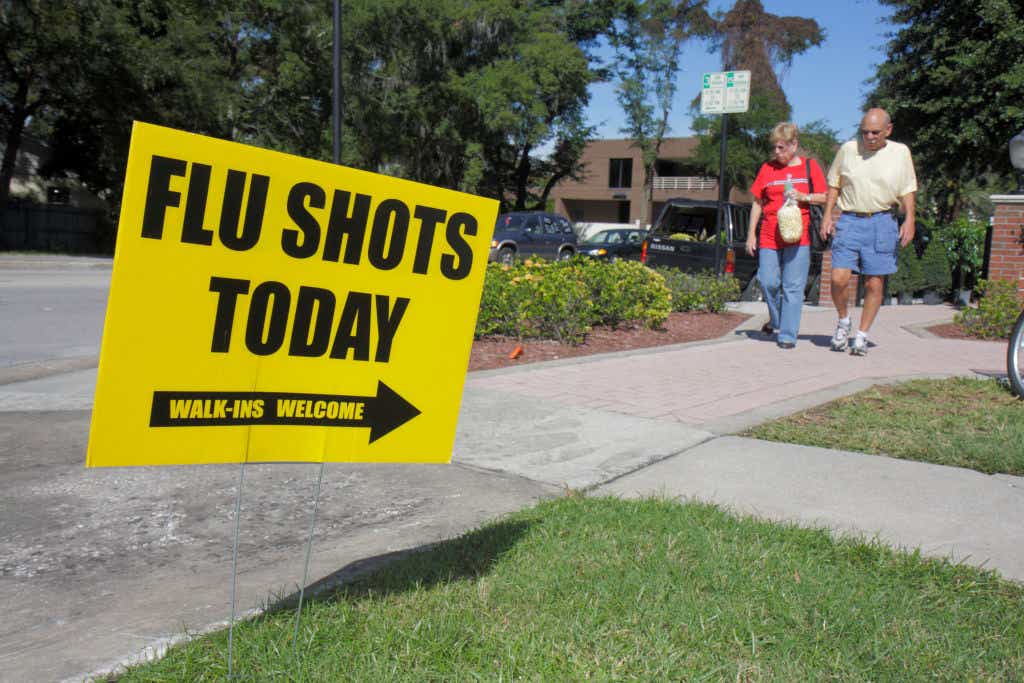It’s hard to believe fall is just around the corner. You may already be sipping on your Pumpkin Spice latte and getting excited to visit the nearest pumpkin patch, but unfortunately, those impending cooler temperatures also mean the start of flu season.
While many of us routinely get our vaccines every year, this time around might look a little different, given new guidance from the Centers for Disease Control — the agency updated its safety measures on Friday. This development comes as experts predict another rough flu season. Though that season typically runs from October to May, you may recall that it hit unusually early and hard last September, with more than 650,000 hospitalizations and as many as 58,000 deaths from the virus across the country.
But some medical experts are advising some people to hold off on getting the vaccine if they can — here’s what we know about the latest flu vaccines, and why when you get it matters.
What are the new flu shot guidelines?
The CDC’s new guidance is largely the same, except for one major update: People with egg allergies can get any vaccine they choose.
This wasn’t always the case. Most flu shots — including the nasal spray vaccine — contain trace amounts of egg proteins like ovalbumin. However, upon further study, health officials concluded that the risk of severe allergic reactions after the flu vaccine in people with egg allergies is “unlikely.”
That means the U.S. has now caught up with many other parts of the world, including Canada and Europe, that've concluded that egg allergies have almost nothing to do with serious allergic reactions to the flu shot.
That said, the CDC still doesn’t recommend that people with allergies to other components of the vaccine — such as gelatin or antibiotics — get it. “People who have had a severe allergic reaction to a flu vaccine in the past should generally not receive flu vaccine again, but might be able to get certain flu vaccines, depending on which one caused the allergic reaction,” the agency's announcement states.
How common are allergic reactions to the flu shot?
The good news is that severe allergic reactions to the flu shot are extremely rare. In a CDC study of more than 25.1 million doses of various vaccines given to children and adults, the rate of anaphylaxis or a life-threatening allergic reaction was 1.35 per million doses for seasonal flu vaccines.
Since allergic reactions can happen even in people without any known allergies, it’s important to be aware of some of the warning signs. If you do experience one, you may develop shortness of breath, wheezing, rapid heartbeat, and other symptoms like a rash and hives. In any of these cases, you’re going to want to seek emergency care right away.
But allergic reactions shouldn’t be confused with the common side effects of flu vaccines, such as a sore arm and low-grade fever, which are completely normal.
Who should get the flu vaccine?
The CDC’s vaccine advisory committee recommends that everyone over the age of six months who doesn't have a "severe, life-threatening" allergy get a seasonal flu vaccine. (For those who can’t get it due to allergies or another health condition, there are alternative therapies, such as antiviral medications that can offer some protection.)
It’s important to note that flu vaccinations are especially important for seniors. The CDC estimates that 70 to 85 percent of flu-related deaths and 50 to 70 percent of flu-related hospitalizations happen among people 65 and older. “This risk is due in part to changes in immune defenses with increasing age,” it states.
Which vaccine should you get?
There are several available vaccines — both egg-based and non-egg — that have been approved by the Food & Drug Administration.
While all are considered equally effective, some might be better than others, depending upon your age among other factors. For instance, adults ages 65 years or older who typically have a weaker response to standard flu shots might want to consider receiving what’s known as a higher-dose shot, which carries extra protection, according to the CDC’s Advisory Committee on Immunization Practices.
If you haven’t quite gotten over your fear of needles, you can opt for the nasal flu vaccine, which is available for people ages 2 through 49 years.
Still, it’s too soon to tell how effective these vaccines will be. “Sometimes we hit, sometimes we miss," infectious diseases specialist Dr. Thomas Russo tells Yahoo Life.
When should you get the flu vaccine?
Flu vaccines aren’t widely available just yet, though various doctor’s offices and pharmacies might already be carrying them. Some places, like CVS and Walgreens, are even letting people schedule their vaccine as early as Sept. 1, so you can get a jump on booking an appointment.
But the timing of when you get your vaccine is key. If you get it too early, experts warn that protection against the flu virus can wane by the time peak flu season rolls around between December and February. That’s why experts and the CDC generally agree that you should hold off until September or October to get your shot. (Of course, there’s an exception: Children under the age of 8 who've never received a flu vaccine will need two doses separated over the course of two months, so it's recommended they get their shot as soon as possible.)
While those months are the ideal timeframe to get your shot, CDC advises that "vaccination should continue throughout the season as long as influenza viruses are circulating."
You also might want to keep an eye on local flu activity. If you see cases spiking in your area, it might not be a bad idea to go ahead and get the flu vaccine. And no, the flu shot can’t cause the flu, so you have might as well protect yourself and others.









